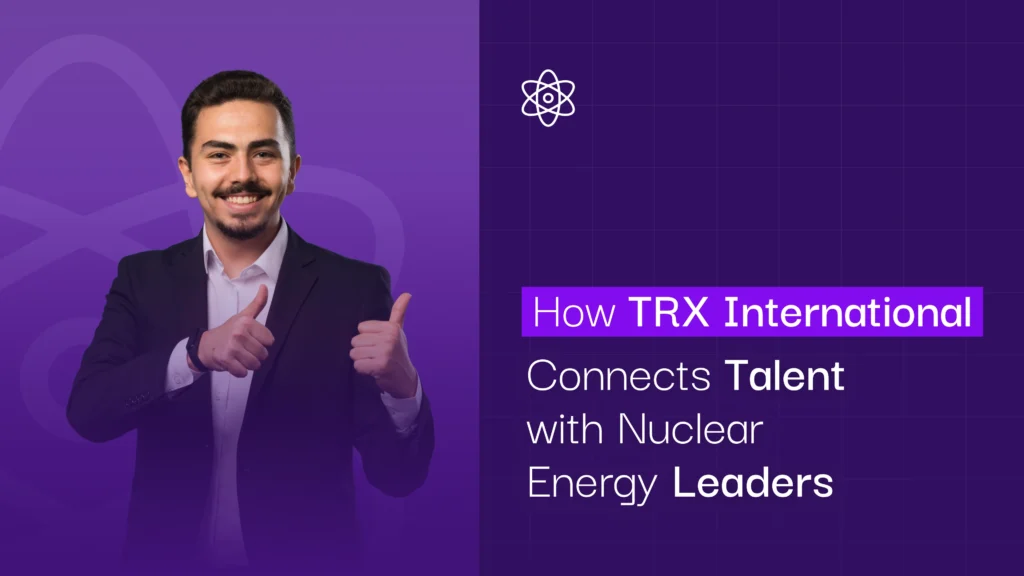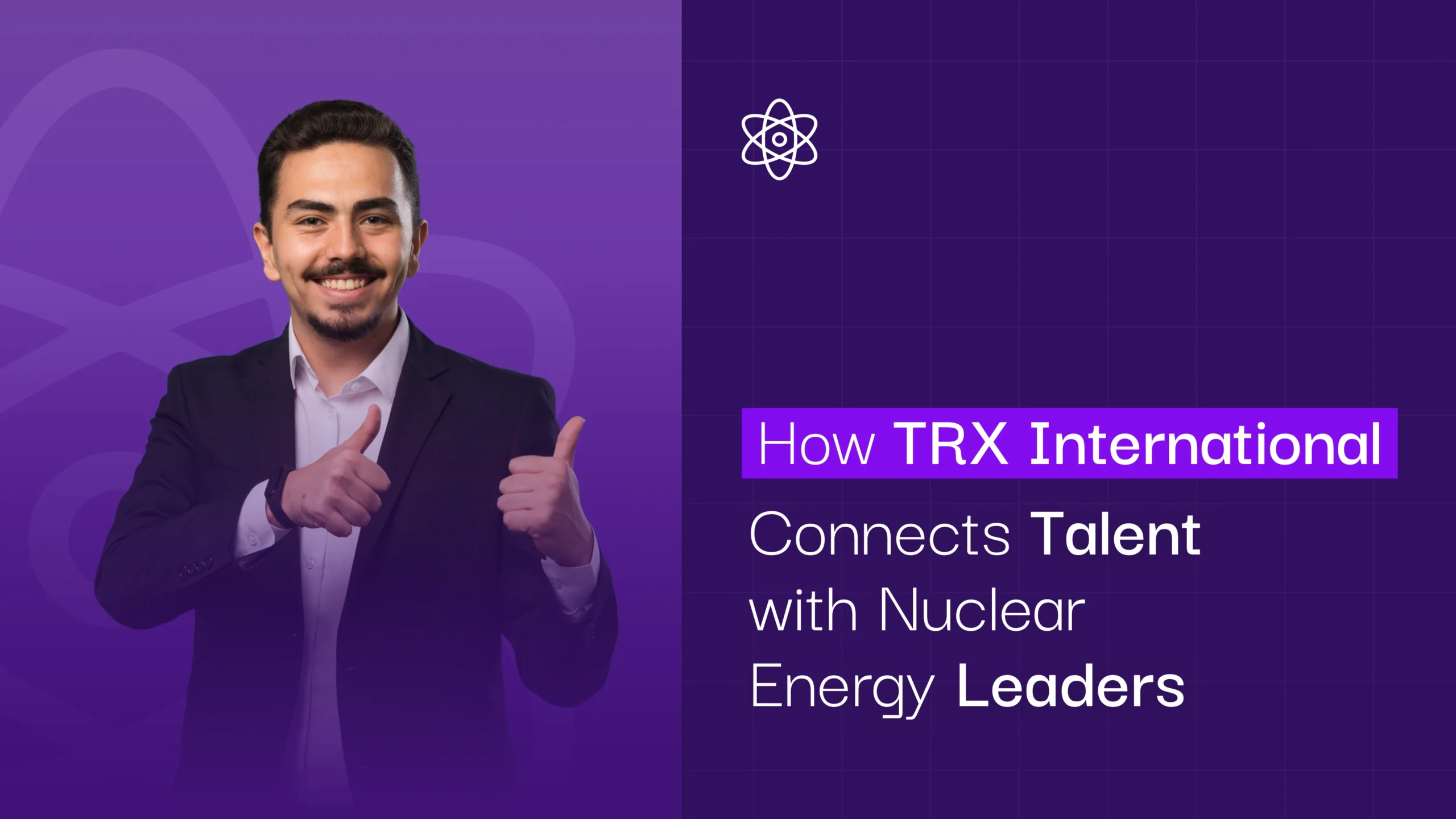The nuclear energy sector is entering a pivotal new era. With global investments rising in Nuclear SMRs (Small Modular Reactors), advancements in Nuclear Fusion, and renewed interest in sustainable baseload power, demand for highly skilled talent is stronger than ever. Organizations are not just looking for engineers and operators; they need specialists who can innovate, manage risk, communicate across disciplines, and support next-generation systems.
Companies, governments, and research institutes are partnering with specialized workforce organizations like TRX International to find talent capable of working across complex nuclear environments. The right skills now go beyond academic knowledge, employers want professionals who can apply technical expertise with discipline, precision, and strategic thinking.
This blog explores the most in-demand skills in the nuclear sector for 2025 and how candidates and teams can position themselves for long-term success.
Why the Demand for Nuclear Talent Is Growing
Global energy strategies are shifting. The push toward decarbonization has placed nuclear power back in the spotlight as a dependable, low-carbon source of energy. This resurgence is driven by:
- Small Modular Reactors (SMRs): Compact, scalable, flexible reactors suitable for diverse regions and grids.
- Nuclear Fusion Research: Rapid development in fusion labs and commercialization pilots.
- Aging Workforce: Many experienced nuclear professionals are nearing retirement, creating a talent gap.
- New Safety and Cyber Standards: The industry is adopting more advanced digital controls requiring modern skill sets.
This change is raising the demand for specialized professionals across nuclear power jobs, nuclear engineering jobs, reactor operations, nuclear safety, project management, digital maintenance, and regulatory compliance.
Top Skills Employers Are Prioritizing in 2025
1. Advanced Technical Expertise
Technical depth remains non-negotiable. Whether in reactor operations, thermal hydraulics, radiation shielding, or fuel cycle engineering, nuclear employers need professionals who can apply theory to real systems.
Key competencies include:
- Reactor physics and core design
- Fuel cycle management
- Radiation detection and measurement
- Structural engineering for nuclear environments
- Preventive and predictive maintenance
These roles frequently involve high-stakes decision-making, requiring not just technical knowledge but mature judgment.
2. Safety-First Mindset
Safety is the foundation of the entire nuclear industry. Employers prioritize personnel who demonstrate:
- Strict adherence to regulatory procedures
- Awareness of human performance principles
- Understanding of emergency response protocols
- Ability to identify, report, and mitigate hazards
Professionals who have worked in regulated environments, even outside nuclear are often valuable. Safety is more than training; it is culture.
3. System Integration and Digital Skills
Nuclear facilities are implementing new digital control systems, remote diagnostics, and data-driven maintenance programs.
In-demand abilities:
- Instrumentation and control (I&C) systems
- SCADA and automation proficiency
- Industrial cybersecurity
- Data interpretation for operational decision support
These skills are particularly relevant in Nuclear SMRs, which are designed for modular, smart, automated operations.
4. Regulatory and Compliance Knowledge
Nuclear operations are governed by thousands of requirements, local, national, and international. Professionals who understand regulatory frameworks, licensing workflows, environmental permitting, and stakeholder communication are highly valuable.
This is especially important for:
- Nuclear project managers
- Safety case authors
- Licensing engineers
- Quality assurance professionals
5. Multidisciplinary Problem-Solving
Modern nuclear careers increasingly require professionals to work across engineering, operations, data, policy, manufacturing, and research environments.
Employers value:
- Strong analytical capabilities
- Scenario-based reasoning
- Ability to evaluate solutions under uncertainty
Nuclear careers often involve novel challenges with no direct historical precedent, especially in Nuclear Fusion development.
6. Communication and Leadership Skills
In nuclear settings, communication can be as critical as technical skill. Clear communication improves safety, knowledge transfer, and operational efficiency.
Professionals who can:
- Lead technical teams
- Communicate complex ideas simply
- Write accurate and structured documentation
- Collaborate with regulators and public stakeholders
The Growing Role of Specialized Talent Support
Because the nuclear workforce is so specialized, organizations rely on expert recruitment and workforce partners to find qualified professionals. TRX International works with utilities, research labs, engineering firms, healthcare providers, and energy developers to support major nuclear workforce initiatives across regions.
The organization also supports candidates with career development through tools such as cv analysis, allowing individuals to align their experience with the specific language, competencies, and standards nuclear employers expect. Performing cv analysis is crucial in roles where precision and clarity are essential.
Additionally, emerging subfields like Nuclear Medicine Talent require distinct academic and clinical training pathways. Demand for Nuclear Medicine Talent is expanding as diagnostic imaging, cancer treatment planning, and radiopharmaceutical development continue to grow. Healthcare institutions often rely on specialized nuclear staffing partners to bridge clinical and technical expertise. Nuclear Medicine Talent development also benefits from structured rotational programs, research partnerships, and ongoing certification pathways.
To support broader workforce planning, organizations maintain and use systems like a Nuclear Talent Database. A strong Nuclear Talent Database allows employers to access candidates based on clearance status, qualifications, reactor system experience, and geographical mobility. Maintaining an updated Nuclear Talent Database helps ensure faster hiring and efficient alignment of talent to project timelines. Specialists managing this system track skill shifts, retirements, and training needs to help organizations anticipate workforce changes. Companies using a Nuclear Talent Database gain a long-term advantage in project readiness and workforce continuity.
For individuals pursuing nuclear roles, engaging with recruitment partners like TRX International and making use of cv analysis ensures that both technical background and professional accomplishments are clearly presented to align with organizational expectations.
How Candidates Can Stand Out in 2025
To enhance hiring prospects in nuclear energy:
1. Gain Hands-On Experience
Internships, apprenticeships, lab research, and operations support roles are highly valued.
2. Get Certifications
Certifications in radiation protection, safety culture, cybersecurity, or advanced reactor training demonstrate capability and commitment.
3. Build Professional Networks
Connect with professional nuclear associations, engineering institutes, and sector events to stay updated.
4. Use cv analysis Services
Using cv analysis helps refine your profile to meet job criteria and highlight the right competencies.
5. Stay Curious and Flexible
The nuclear industry is evolving rapidly; continuous learning matters.
The Strategic Role of Workforce Partners
The energy transition requires not just new technologies but the people to deploy them. Workforce specialists like TRX International help organizations identify capability gaps, plan training pathways, and develop leadership pipelines to support long-term nuclear growth. By combining recruitment, training support, and access to the Nuclear Talent Database, they help ensure that nuclear projects are delivered safely, on schedule, and with the right mix of expertise.
Also Read – From Student to Specialist: Career Pathways in the Nuclear Sector
Conclusion
The nuclear sector is advancing faster than ever, creating exciting opportunities for skilled professionals. Whether your interests lie in SMRs, fusion development, reactor operations, nuclear medicine, or regulatory strategy, organizations need talent with deep technical expertise, a safety-driven mindset, and strong problem-solving and communication skills.
By refining your experience through cv analysis, connecting with specialized partners like TRX International, and understanding the capabilities employers value, you can confidently position yourself for leadership and long-term career growth in one of the world’s most critical energy industries.
FAQs
Q1. Which nuclear roles are most in demand in 2025?
Reactor engineers, radiation protection specialists, nuclear project managers, control systems engineers, and nuclear medicine technologists are among the most in-demand roles.
Q2. How important is safety training in nuclear careers?
Safety training is essential; it is foundational to all operations and compliance requirements in the nuclear sector.
Q3. Are Nuclear SMRs increasing job opportunities?
Yes. Nuclear SMRs are creating roles in design, fabrication, project engineering, remote operations, maintenance, and regulatory support.
Q4. How can I improve my chances of getting hired?
Use cv analysis, pursue certifications, seek hands-on experience, and align your skill set with industry needs.
Q5. Does nuclear medicine require different qualifications than power sector nuclear roles?
Yes. Nuclear Medicine Talent typically requires medical imaging or radio pharmacy training in addition to nuclear science knowledge.






